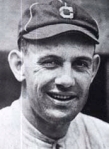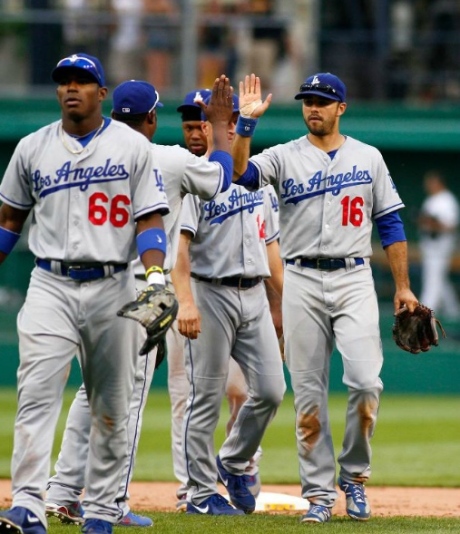Everything is right and everything is wrong with baseball.”
— Mark Harris, preface to “Diamond: The Baseball Writings of Mark Harris,” 1994
The incredible writer of the Henry Wiggen tetralogy could have been talking about last night’s game, when the Dodgers showed unbelievable grit, rallying for four in the fifth inning to take a 4-3 lead, then squandering everything in the 12th beneath the 500-pound gorillas of Ronald Belisario and Brandon League.
There isn’t much more to say about the game, so let me talk about Mr. Harris, the greatest baseball writer the nation has ever produced.

New York Yankees pitcher Carl Mays

Cleveland Indians shortstop Ray Chapman
In “Diamond,” Harris recounts the tragic true story of Ray Chapman and Carl Mays.
“A single moment of baseball,” Harris writes, “has remained forever unlike any other. Memorable moments have winners and losers. This moment had no winners. Everybody lost.”
Ray Chapman was a shortstop for the Cleveland Indians that August of 1920. He was a sweetheart beloved by all his teammates, married and expecting a baby.

Carl Mays “slings the pill from his toes,” said one Baseball Magazine writer.
Carl Mays was a pitcher for the Yankees, morally rigid and unlikeable, whose “submarine” pitching style was described by one Baseball Magazine writer as looking “like a cross between an octopus and a bowler.”
In the top of the fifth in a game at the Polo Grounds, Cleveland was ahead of the Yanks, 3-0, and clinging to a slim lead in the American League. Chapman came to the plate to lead off the inning and was struck in the head by one of Mays’ crazy pitches. He went down and was taken to the hospital where he died later that night. All of baseball mourned the passing of this “glorious example of our American manhood,” as he was eulogized. The priest performing the ceremony also asked forgiveness for the man who had accidentally killed Chapman.
But Mays became even more hated as “a vicious creature who threw beanballs at other players,” according to Harris. Mays said he was just trying to brush Chapman back, that he had expected Chapman to move out of the way. “That’s what I was paid to do,” he said. “Get the ball over the plate.”

Arizona pitcher Ian Kennedy is developing a reputation for plunking batters.
On Dodgers Live yesterday, Ian Kennedy said essentially the same thing. He tried to claim he wasn’t aiming for Zack Greinke’s head, the ball just got away from him. But in the same breath he added that he was also trying to get even for “Miggy” (D’backs catcher Miguel Montero), who had been hit by Greinke an inning earlier in retaliation for another beanball Kennedy threw that had slammed Yasiel Puig in the face.
This is a dangerous game Kennedy is playing, whether he thinks it’s “what I was paid to do” or not.
Carl Mays’ career and reputation went into a downward spiral after Chapman’s death. “Nobody ever remembers anything about me,” he told the Sporting News in 1963, “except one thing — that a pitch I threw caused a man to die.”
I don’t think Ian Kennedy wants to be remembered that way, so he better reconsider the way he’s playing before it’s too late.
 Hey, remember how at the start of the season everyone was saying the Dodgers are the new Yankees, because the L.A. payroll had exceeded that of the Bronx Bombers, and of course more spending means more winning, right?
Hey, remember how at the start of the season everyone was saying the Dodgers are the new Yankees, because the L.A. payroll had exceeded that of the Bronx Bombers, and of course more spending means more winning, right?






